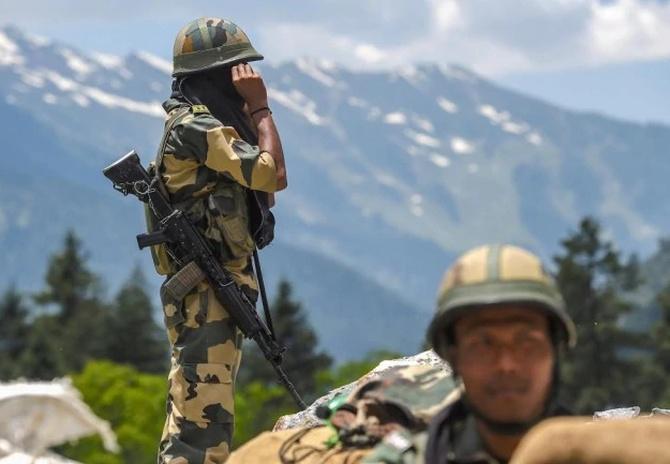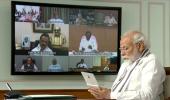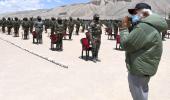'China has gone too long as a rogue power, trashing international norms, agreements, and treaties as if they were not the paper they were written on.'
'The ill-advised attack on Ladakh may be the beginning of the end of that nonsense,' advocates Rajeev Srinivasan.

- Part 1 of the column: Ladakh Stand-off: Be prepared to meet fire with fire
- Part 2 of the column: The Day of Reckoning has arrived for China
Repeated Prisoner's Dilemma
The game-theory construct of the Prisoner's Dilemma is well-known as a model for behavior in the absence of full information or trust.
The two actors, A and B, can either cooperate with or betray the other.
Neither actor knows what the other will do as they are held incommunicado.
If A betrays B and vice versa, both get penalised lightly.
If A betrays B and B cooperates, then A gets a good payoff and B gets penalised heavily.
If both co-operate, both benefit.
Co-operation produces the optimal outcome, but rational players will gauge the downside risk of being betrayed more heavily than the upside benefit of co-operation, which leads to a surprising outcome: If you intend to play this game once, the best tactic is to betray the other party.
But if you will play this game repeatedly, then it is not clear what the long-term strategy is.
All sorts of elaborate strategies have been developed and simulated in millions of computer interactions, and it turns out a little surprisingly that 'tit for tat' is the best strategy so far devised.
That is, A starts off by co-operating; B responds.
In the next round, A does whatever B did in the first round.
Foreign policy can be modeled as an endless Prisoner's Dilemma.
Thus, in each interaction, there is a choice of co-operating or betraying the other side.
Based on the fallout, various lessons are learned, and then it's onwards to the next round -- talks, war, whatever.
It appears that Narendra Modi takes a game-theoretic Prisoner's Dilemma view of foreign policy.
He starts off with co-operation, and if that doesn't work, he reverts to the 'tit-for-tat' strategy.
In many cases, it is necessary to inflict pain on the other side to get your point across.
With Pakistan, there was the initial bonhomie with Nawaz Sharief, including the surprise trip to that country. Cooperation.
This was repaid by a series of attacks, including Pathankot and Pulwama. Betrayal.
The Indian response? Uri. Balakot. Betrayal, tit-for-tat.
If Pakistan were a rational player, it would note that its long-term nuclear escalation theatrics are in tatters, and with the abrogation of Article 370 Modi pwned them on Kashmir as well.
Similarly with Malaysia and Mahathir Mohammed. Initial friendliness, but when Malaysia began its Pakistan-Malaysia-Turkey axis talk, they were hit with the palm oil ban.
The message got across.
Similarly Turkey. Its $2.3 billion contract for building fleet support vessels was frozen in October. (Much to my surprise, it was given the go-ahead in May, which rather damages my thesis of measured tit-for-tat responses. However, Turkey has toned down the rhetoric.)
The same, broadly, with the US too.
Initial outreach to Obama, despite the fact that Obama's regime had not overturned a visa ban on Modi -- literally the only person thus humiliated under some obscure law -- throughout its tenure. Later bonhomie with Trump. On average, the result has been continued cooperation by both parties, to mutual benefit (despite irritants like the withdrawal of GSP benefits and the recent H1-B visa ban).

If this hypothesis is correct, we are now reaching a point where Modi has decided that a little betrayal of the Chinese is in order, after a series of co-operative moves by him, followed by betrayals by them.
There were the summits in Wuhan and Mahabalipuram.
Chinese betrayals included the FATF move to shelter Pakistan, the refusal to let India into the Nuclear Suppliers Group, and the refusal to allow some Pakistanis to be declared terrorists.
The Indian side responded.
India was the only nation that stood up and said 'Absolutely not!' to the entire BRI story.
It has, even though belatedly, sought to eliminate Huawei from consideration in large telecom deals.
And at least now, during the clashes, Chinese L1 bidders are finding their bids being disqualified for large projects.
One of the criticisms against Modi is that he has continued the old policy of fruitlessly appeasing the Chinese, and has not responded in kind.
Mohan Malik, in a tweet, said, 'The debate is over. Xi's crushed Modi's $5 trillion eco plan by '24'".
In an essay in Open magazine, Brahma Chellaney said, 'India needs to make a fresh start by abandoning its accommodating approach toward China that has made it look like a meek enabler. After spending so many years on the defensive, India must discard the platitudes and retake the narrative.'
The outcome may well be that India, instead of waiting passively for China to strike at leisure, actually takes the initiative in pre-emptive strikes where India has an advantage.
This could be risky, and could lead to escalation, but history suggests that when India stands up to China, the latter retreats, as is normal for a bully.
We may see an Indian strike in Tibet in the near future.
That would be most obviously 'tit-for-tat'.
This is in addition to the boycott and trade war.
The removal of 59 Chinese apps from the Play Store, and the go-slow customs activity on incoming Chinese goods are signals of a new determination.
So was the prime minister's rousing speech in Leh.
In addition to the messages of support to the front line troops, there was no ambiguity in the speech: Without naming names, he declared that the age of expansionism was over.
Even more tellingly, he referred to Sri Krishna's sudarsana chakra, and the implication was clear: The story of Sisupala, one hundred of whose transgressions the Lord forgave, before beheading him with the discus.
There is a time of reckoning for the wicked, the PM implied; and also that while the wheels of karma might grind slowly, they do grind unstoppably.
Vrtra the dragon and releasing the waters

This is an insight from Sanjeev Sanyal, and it is delightfully appropriate.
There is the Rg Vedic metaphor of Indra slaying Vrtra the dragon, who had blocked the flow of a river in Kashmir, thus denying life-giving water to those downstream.
China is notorious for using water as a weapon, for instance building so many dams on the Mekong headwaters in Tibet that the river downstream has shrunk to a trickle in the summer, causing drought in Vietnam, Cambodia etc.
It would be poetic justice if another Indra -- Narendra in this case -- were to slay the Chinese dragon and release the waters.
In other words, the Chinese empire may collapse because of an avalanche of events triggered by Modi standing up to the bully, and Tibet may be released from its clutches.
There are clearly a number of ways of looking at the India-China stand-off right now.
No single perspective captures the whole <gestalt, but together, we need to arrive at a way of either co-existing with, or containing, or in the extreme case, balkanising, the Chinese empire.
We have tried sama and dana in Chanakyan terms.
Now come bheda, which the empire is ripe for, and if all else fails, danda.
We have to be prepared to take a significant amount of pain.
That's how great powers are: They can take pain, and they can inflict pain.
So far India has done only the former.
It's time to now find out if it can do the latter as well.
China has gone too long as a rogue power, trashing international norms, agreements, and treaties as if they were not the paper they were written on.
The ill-advised attack on Ladakh may be the beginning of the end of that nonsense.
Rajeev Srinivasan is one of Rediff.com's earliest columnists.
You can read Rajeev's columns here.
Feature Production: Aslam Hunani/Rediff.com










